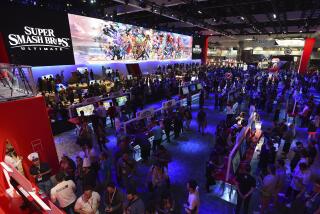Industry Moves On After Year of Bad Publicity
- Share via
For more than a decade, the computer game industry has struggled to shed its geek image and gain recognition as a legitimate entertainment business. And though sales continued to flourish--the industry hauled in $6.3 billion in revenue in 1998 and is expected to break the $8-billion mark in 1999--the world of gaming continued to be misunderstood and often feared by the masses.
The massacre at Columbine High School in Colorado--in which the teen assailants were said to have been avid fans of violent computer games--led to the labeling of teenage game fans as “troubled youth.”
Going into the new year, game executives are divided over how to deal with this unwanted attention. Some software developers opt to ignore the issue altogether, while others are pushing to restore the industry’s image by boosting its presence in Washington and educating the public about its 5-year-old ratings system.
If anything, the outrage helped promote violent titles such as Xatrix Entertainment Inc.’s “Kingpin: Life of Crime,” which hit the shelves in June. The controversial title, though specifically marketed to adults, had players trying to infiltrate organized-crime rings and do whatever it takes--including killing people--to take over a city.
But amid national hysteria over violence in society, there was a growing sense among the computer savvy that game makers should be free to provide content that is as thematically wide-ranging--and controversial--as what Hollywood offers up on film.
Though sales were up, profits were down for many game makers, which cited problems with meeting deadlines and trimming production budgets. Consolidation flourished throughout the industry and, analysts predict, the trend will continue throughout next year.
French software developer Titus Interactive bought a controlling share of Irvine-based Interplay Entertainment Corp. in June for $25 million. Infogames Entertainment, Europe’s No. 1 maker of video game software, said in November that it would purchase a 70% stake in GT Interactive Software Corp. for $135 million in cash and notes. And Ubi Soft Entertainment, headquartered in Paris, announced in May that it picked up the PC game assets of Interactive Magic Inc. for an undisclosed sum.
Game fans know, however, that the best fight in 2000 won’t be fought between players on the Internet. Instead, the real battle will be waged over who will dominate the video-game console market: Sony, Nintendo or Sega?
The big three video game makers spent a total of $400 million in marketing late this year, which was kicked off by Sega pushing its much-anticipated Dreamcast machine, the industry’s most powerful console device.
Though Dreamcast has sold well, industry watchers say that the retail landscape could change once Sony Computer Entertainment of America unveils its PlayStation 2 late in 2000.






